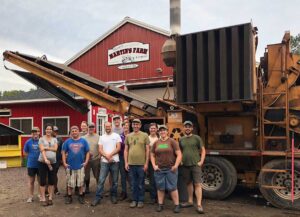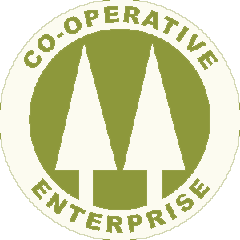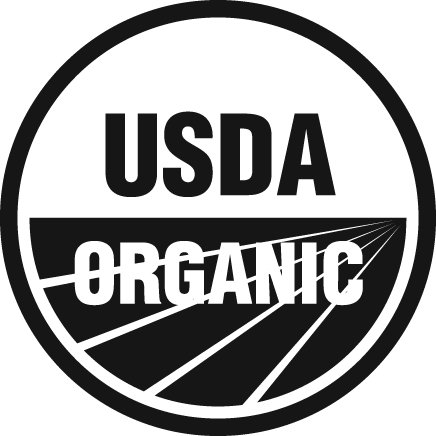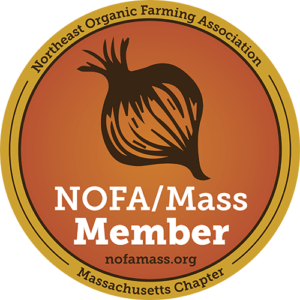
When we arrived at Martin’s Farm in Greenfield, MA on a Monday in mid-September, Adam Martin was in the driveway, repairing a yellow machine the size of a fire truck with “The Beast” written on its side. Adam welcomed us with a wide smile and grease-streaked cheeks. We had traveled up the road to Martin’s Farm for our annual staff field trip, an opportunity to meet our partners in building a strong regional food system. To begin our tour, Adam introduced us to The Beast, which can grind 1 ton of food scraps per minute. Adam, who studied diesel mechanics before he went to business school, wears many hats on this farm, from owner to tour guide to repairer of The Beast.
Ma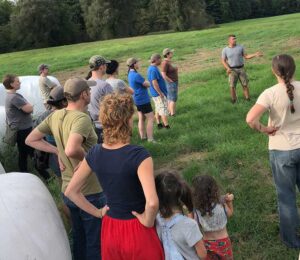 rtin’s Farm is one of a handful of family-run compost farms in Massachusetts. Bob Martin, Adam’s Father, started the farm in 1981, and in 1987 he got one of the first state permits for on-farm composting. They now accept up to 22 tons of compostables per day and sell multiple blends of high quality compost. Real Pickles has been sending our vegetable waste to Martin’s farm for over a decade. In the early years, we brought our compostables to Martin’s in a pick-up truck. Now, we send Martin’s over 60,000 lbs of compostables each year – that’s 97% of our facility’s entire waste stream. By composting our scraps into soil nutrients that farmers can return to their fields, Martin’s Farm is one of the crucial links that closes the loop between farms, fermentation, and people’s forks.
rtin’s Farm is one of a handful of family-run compost farms in Massachusetts. Bob Martin, Adam’s Father, started the farm in 1981, and in 1987 he got one of the first state permits for on-farm composting. They now accept up to 22 tons of compostables per day and sell multiple blends of high quality compost. Real Pickles has been sending our vegetable waste to Martin’s farm for over a decade. In the early years, we brought our compostables to Martin’s in a pick-up truck. Now, we send Martin’s over 60,000 lbs of compostables each year – that’s 97% of our facility’s entire waste stream. By composting our scraps into soil nutrients that farmers can return to their fields, Martin’s Farm is one of the crucial links that closes the loop between farms, fermentation, and people’s forks.
We followed Adam out of the driveway, over the truck scale where loads of compostables are weighed, and down the road to the composting yard. The air smelled like fresh mulch – a rich, woody, slightly sharp scent. Here, amidst the windrows of compost from this summer, Adam walked us through the whole composting process. When food scraps arrive, staff sort through the load by hand to remove anything not compostable. The sorted loads are digested by The Beast, and then mixed in the right ratios of nitrogen materials (food scraps) to carbon materials (wood chips, leaves, etc.). This recipe of nitrogen and carbon is the key to composting: the microbes that break down the compostables need the right habitat to thrive. While the microbes get to work, Adam monitors temperature and moisture in the compost piles to keep them happy. In 3-4 months, the microbes have digested the food waste into rich organic matter and raw nutrients. Just like any other farmer, Adam’s composting season has been affected by all the rainy weather this summer; the extra moisture made the compost heavier, and backed up his schedule because he had to wait for the the sun to dry out the piles.
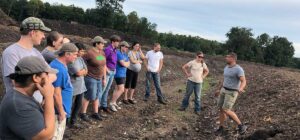 Back in the driveway at the end of the tour, Adam is quick to point out that he couldn’t make a difference in the food system without the schools, businesses, and neighbors who send him food scraps. And together, there is more we can do to reduce food waste. According to the MA Food System Collaborative, in 2017, approximately 900,000 tons of food were thrown away in Massachusetts – that’s enough food waste to keep The Beast running for a year and 8 months, with no breaks! With municipal landfills at capacity, regulators have created incentives to compost food waste instead of trashing it. Massachusetts enacted a ban on commercial food waste in 2014, and the ban has increased the demand for compost collection and transportation. So far, two worker cooperative businesses have started up to meet this need: CERO Co-op based in Dorchester and serving Boston, and The Compost Cooperative based Greenfield and delivering to Martin’s Farm.
Back in the driveway at the end of the tour, Adam is quick to point out that he couldn’t make a difference in the food system without the schools, businesses, and neighbors who send him food scraps. And together, there is more we can do to reduce food waste. According to the MA Food System Collaborative, in 2017, approximately 900,000 tons of food were thrown away in Massachusetts – that’s enough food waste to keep The Beast running for a year and 8 months, with no breaks! With municipal landfills at capacity, regulators have created incentives to compost food waste instead of trashing it. Massachusetts enacted a ban on commercial food waste in 2014, and the ban has increased the demand for compost collection and transportation. So far, two worker cooperative businesses have started up to meet this need: CERO Co-op based in Dorchester and serving Boston, and The Compost Cooperative based Greenfield and delivering to Martin’s Farm.
Adam sent us on our way with tractor air fresheners as souvenirs, and a fresh commitment to take stickers off our fruit peels when we compost them. We’re grateful to share a place in the food system with dedicated, food-humored people like Adam and the Martin’s Farm crew!
